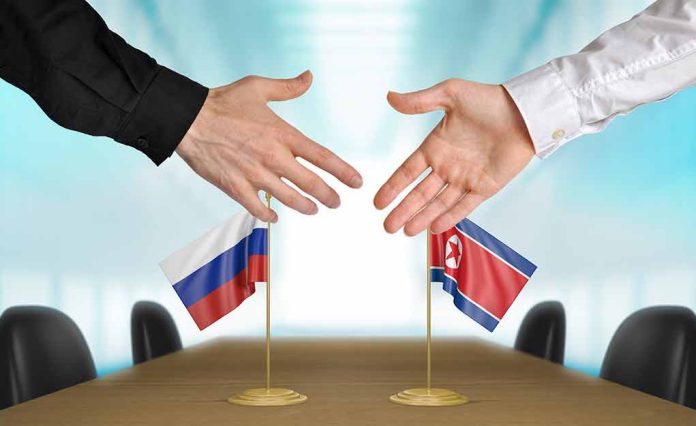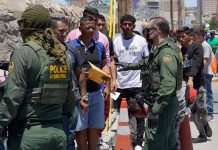
Russia and North Korea join forces in Kursk, mobilizing 50,000 troops to confront Ukraine’s unexpected territorial gains.
At a Glance
- Russia and North Korea have assembled 50,000 troops to retake the Kursk region from Ukraine
- North Korean soldiers have been sighted in Kursk, with about 11,000 troops supporting Russian forces
- Ukraine’s earlier advances in Kursk are now threatened by this joint military buildup
- The alliance marks the closest collaboration between Russia and North Korea since the Cold War
- Western nations express concern over potential regional instability due to this partnership
Russia-North Korea Alliance Challenges Ukraine’s Gains
In a significant escalation of the conflict in Ukraine, Russia has forged a military alliance with North Korea, assembling a force of 50,000 troops in the Kursk region. This development comes as a direct response to Ukraine’s recent territorial gains, threatening to reverse the progress made by Kyiv’s forces. The mobilization includes approximately 11,000 North Korean soldiers, marking an unprecedented level of cooperation between Moscow and Pyongyang since the Cold War era.
The presence of North Korean troops in Kursk not only bolsters Russia’s military capabilities but also allows for a strategic redistribution of Russian forces to other critical areas along the front. This realignment creates a more challenging defensive scenario for Ukraine, which now faces a reinvigorated and diversified opponent.
Ukraine’s Counteroffensive and Current Challenges
Ukraine’s initial success in pushing into the Kursk region was part of a surprise counteroffensive launched in August. This incursion, aimed at creating a “buffer zone” to prevent future Russian attacks, marked the first ground invasion of Russia by a foreign power since World War II. Despite maintaining control over significant territory within Russia, Ukrainian forces now find themselves in a precarious position as they confront the combined Russian and North Korean troops.
The situation in Kursk is further complicated by ongoing Russian offensives in other regions. Moscow continues to launch attacks along the border in Kharkiv, Kherson, and Donetsk, with Kharkiv experiencing intense bombardments and daily civilian casualties. The capture of Donetsk remains a priority for Russian forces, who are closing in on the strategic city of Kurakhove from three sides.
The Russian military has assembled a force of 50,000 soldiers, including North Korean troops, as it prepares to begin an assault aimed at reclaiming territory seized by Ukraine in the Kursk region of Russia.https://t.co/x6dGVujGwv
— Tim O'Brien (@TimOBrien) November 10, 2024
North Korean Involvement and International Concerns
The involvement of North Korean troops in the conflict raises significant international concerns. These forces are reportedly divided into specialized units, including assault and support groups. Ukrainian intelligence suggests that North Korean soldiers have already engaged in combat against Ukrainian defenders, resulting in casualties.
This military cooperation between Russia and North Korea is underpinned by a mutual defense treaty signed by Russian President Vladimir Putin, further solidifying the alliance between the two nations. The presence of North Korean forces in the conflict has drawn criticism from Western nations, who warn of potential regional instability and the implications of such cooperation on global security dynamics.
Looking Ahead: Implications for the Conflict
As the situation in Kursk evolves, the international community watches closely. The alliance between Russia and North Korea represents a significant shift in the conflict’s dynamics, potentially prolonging the war and complicating diplomatic efforts to reach a resolution. For Ukraine, the challenge of defending against this reinforced assault while maintaining its recent gains presents a critical test of its military capabilities and resolve.
The coming weeks will be crucial in determining whether Ukraine can withstand the pressure from this new alliance or if the Russia-North Korea cooperation will succeed in altering the course of the conflict. As both sides prepare for intensified fighting, the international community must grapple with the broader implications of this escalation and its potential impact on regional stability and global security.
Sources:
Moscow prepares 50,000 Russian and North Korean troops to retake Kursk from Ukraine: officials
Ukraine is fighting 50,000 troops in Russia’s Kursk region, Zelensky says
Russia has trained 50,000 troops, including those from DPRK, for offensive in Kursk region













